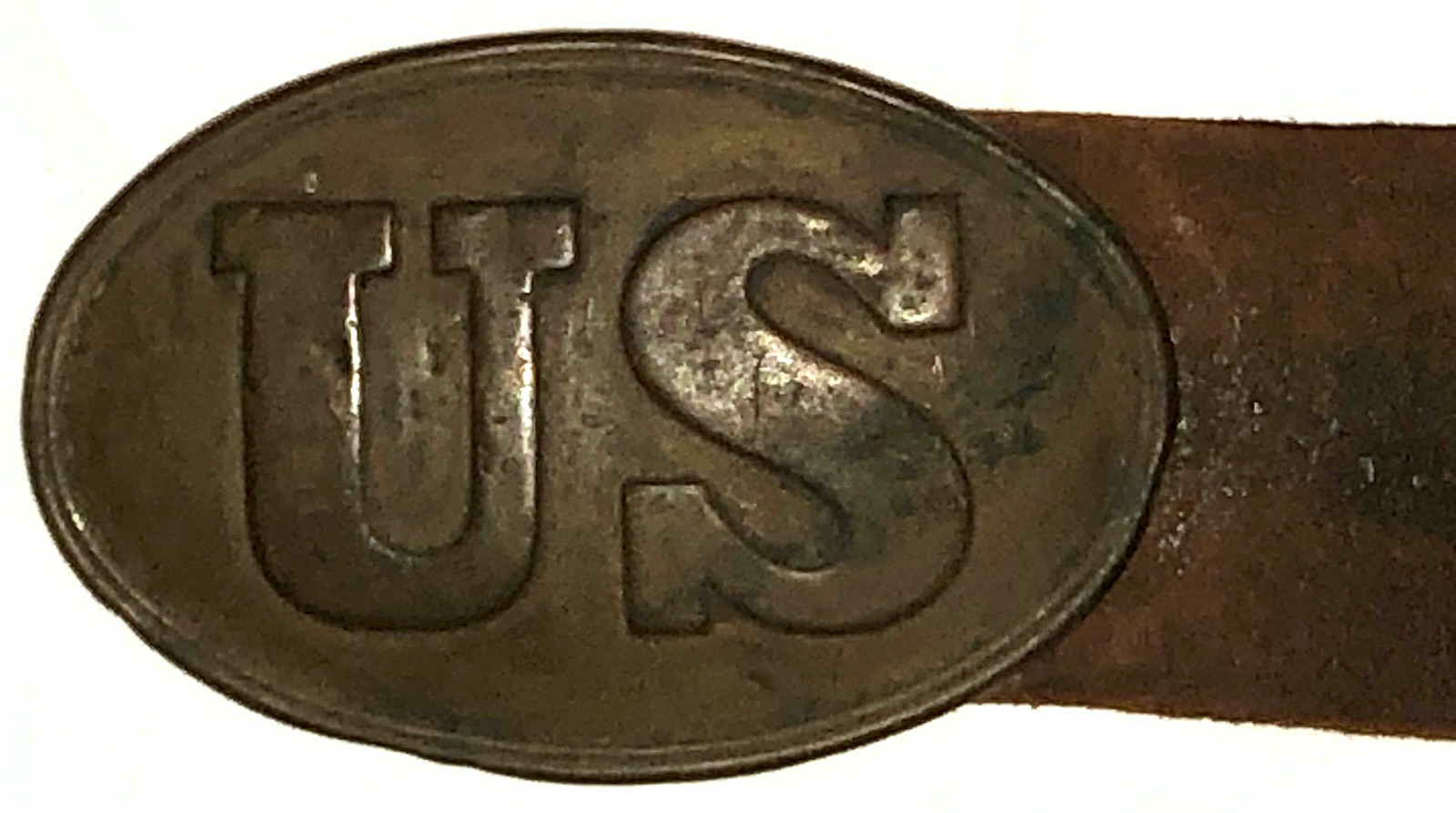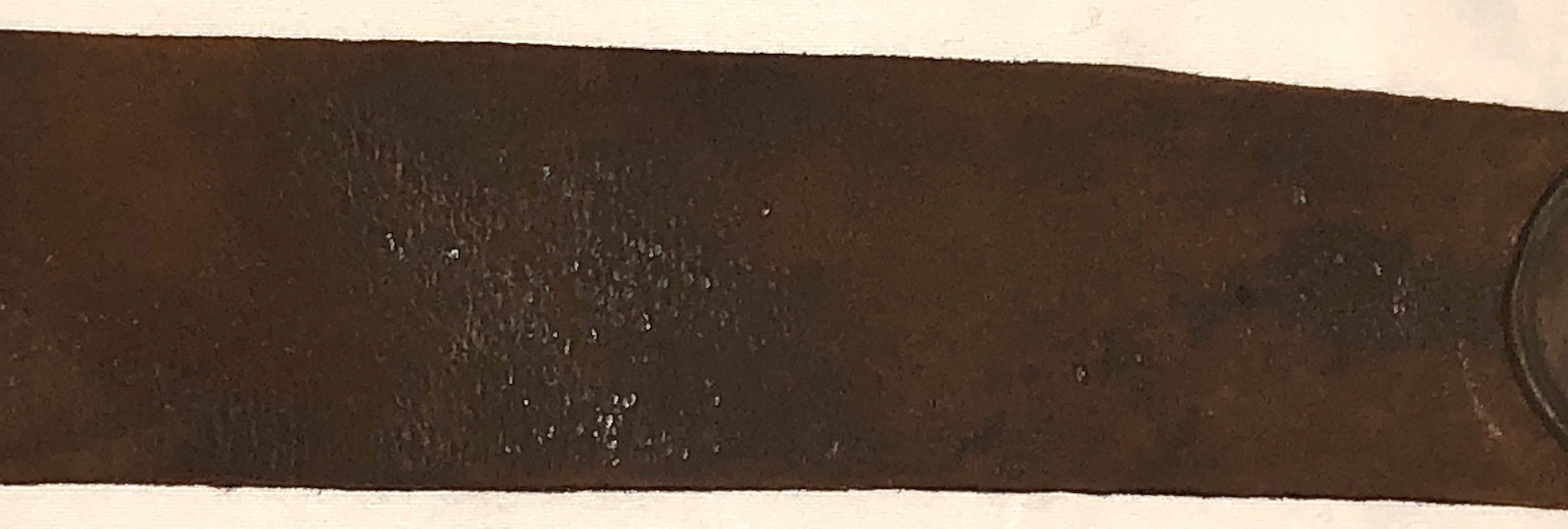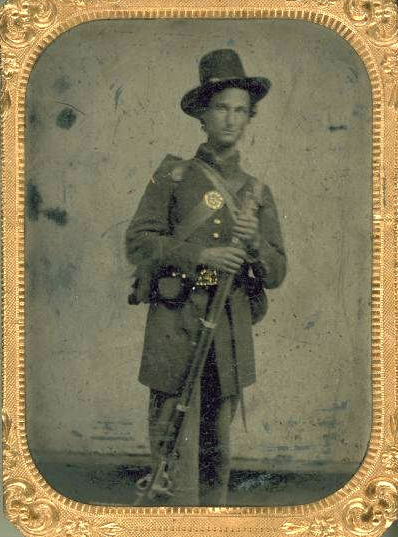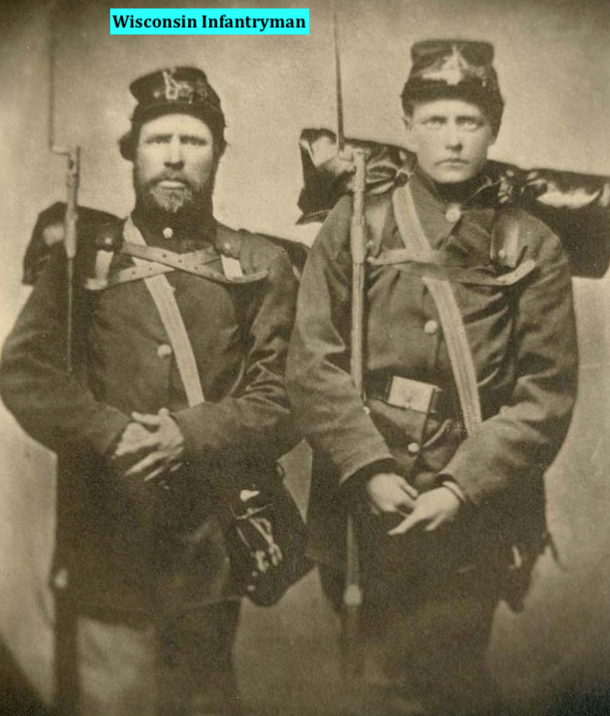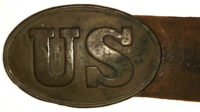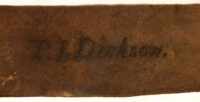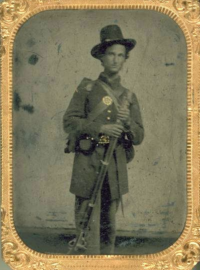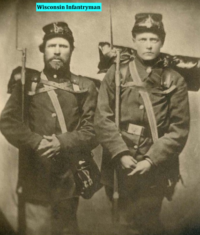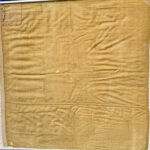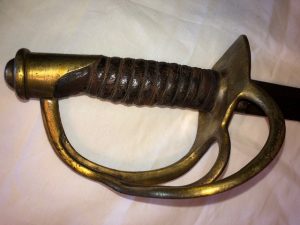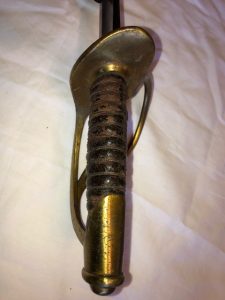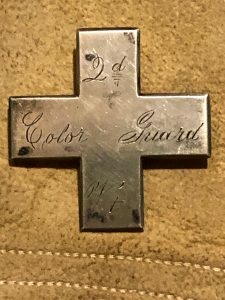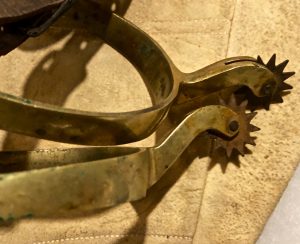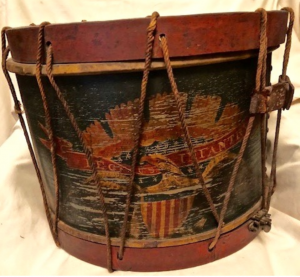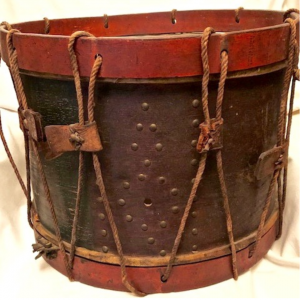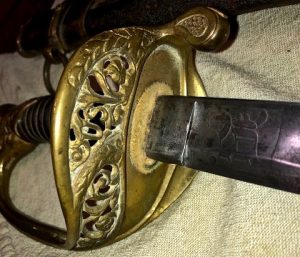Id’d Civil War Union Infantry Enlisted Man’s Belt – Thomas L. Dickson Co. D 32nd Wisconsin Infantry
SOLD
Id’d Civil War Union Infantry Enlisted Man’s Belt – Thomas L. Dickson Co. D 32nd Wisconsin Infantry – This belt is a typical, Civil War, Union Infantry belt; written in ink, on the interior of the belt, is the following:
“T. L. Dickson”
Research indicates that this soldier was Thomas L. Dickson, from Rushford, Wisconsin. Dickson enlisted, as a Private, in August, 1862, in Co. D of the 32nd Wisconsin Infantry. He remained in that regiment, until April, 1864, when he transferred into the Veteran Reserve Corps. During the course of his service, Private Dickson would be active during the Vicksburg Campaign, as well as numerous smaller episodes of combat, in the Western Theater.
This belt is constructed of finished bridle leather, painted black on the finished side; the black finish has about 50% remaining, with some light flaking, although the belt remains in overall strong, supple condition. Affixed to one end of the belt is a typical, mid-war, triangular-pronged, US enlisted man’s, oval belt plate; the plate is in excellent condition and retains a darkened, aged patina.
Thomas L. Dickson
| Residence Rushford WI;
Enlisted on 8/21/1862 as a Private.
On 8/21/1862 he mustered into “D” Co. WI 32nd Infantry He was transferred out on 4/28/1864
On 4/28/1864 he transferred into Veteran Reserve Corps (date and method of discharge not given)
|
32nd WI Infantry
( 3-years )
| Organized: Camp Bragg, Oshkosh, WI on 9/25/62 Mustered Out: 6/12/65 at Crystal Springs, MDOfficers Killed or Mortally Wounded: 1 Officers Died of Disease, Accidents, etc.: 1 Enlisted Men Killed or Mortally Wounded: 26 Enlisted Men Died of Disease, Accidents, etc.: 253 (Source: Fox, Regimental Losses) |
| From | To | Brigade | Division | Corps | Army | Comment |
| Oct ’62 | Nov ’62 | 5 | District Memphis, 13 | District and Army of West Tennessee | New Organization | |
| Dec ’62 | Mar ’63 | 3 | 8 | Left Wing, 16 | Department of the Tennessee | |
| Mar ’63 | Nov ’63 | 2 | 5 | Left Wing, 16 | Department of the Tennessee | |
| Jul ’63 | Dec ’63 | 1 | 6 | 16 | Department of the Tennessee | |
| Dec ’63 | Jan ’64 | 3 | 1st Cav | 16 | Department of the Tennessee | Mounted Inf |
| Jan ’64 | Mar ’64 | 2 | 4 | 16 | Department of the Tennessee | |
| Jun ’64 | Aug ’64 | Decatur, AL | District North AL | Dept and Army of Ohio and Cumberland | ||
| Sep ’64 | Jul ’65 | 3 | 1 | 17 | Department of the Tennessee | Mustered Out |
Thirty-second Infantry
WISCONSIN
(3-YEARS)
| Thirty-second Infantry. — Cols., James H. Howe, Charles H. De
Groat Lieut.- Cols., William A. Bugh, Abel B. Smedley, Charles H. De Groat Joseph H. Carlton; Majs., Abel B. Smedley, Charles H. De Groat, Joseph H. Carlton, William S. Burrows.
This regiment was organized at Camp Bragg, Oshkosh, was mustered in Sept. 25, 1862, and left the state Oct. 30. It reached Memphis on Nov. 3, and joined Sherman’s movement toward Vicksburg, but returned late in Jan. 1863, the surrender of Holly Springs defeating the object of the expedition.
The regiment acted as provost guard at Memphis until November, then moved to LaGrange reached Moscow Dec. 3, just in time to repulse the enemy’s attack on Hatch’s cavalry; was sent to Vicksburg in Jan., 1864, where it was attached to the 2nd brigade, 4th division, 16th corps, and took part in the Meridian expedition.
It held a pontoon bridge at Jackson until the troops had passed and then destroyed it. The regiment was attacked in February by a brigade of Confederate cavalry, while destroying the Mobile & Ohio railroad, but it repulsed the attack handsomely.
It returned to Vicksburg in March, thence to Memphis Tenn., Cairo, IL, and Paducah, Ky.; up the Tennessee river, 200 miles, to Crump’s Landing; thence across Tennessee to Decatur, Ala., where it was attached to the 3rd brigade, and was engaged in guard duty and building fortifications.
Cos. A, C, D and F. with a small additional force, engaged in a sharp skirmish with a large body of the enemy in May and was compelled to fall back. The following day the brigade, with artillery and cavalry, followed the enemy for 7 miles. The regiment, which was in the advance, met a portion of the enemy and drove them to their main force, whereby an impetuous charge, the Federals completely routed them.
The regiment also dispersed a small body near Courtland and then returned to camp. It was attacked by a superior force while guarding a wagon train at Courtland in July, but repulsed the enemy repeatedly, bringing the train safely into camp. The following day it was engaged in the action that forced the enemy from his works near Courtland.
It then joined Sherman’s army in the siege of Atlanta, was constantly under fire until Aug. 24, and it was in the battle of Jonesboro. It was transferred to the 3d brigade, 1st division, 17th corps, and was on picket and guard duty until October at East Point. It then moved to Atlanta and in November joined the march toward Savannah, destroying railroads and public property and skirmishing at the Little Ogeechee and Marlow.
It remained in the vicinity of Savannah until Jan. 3, 1865, when the campaign of the Carolinas was commenced. It forced the enemy from his works at Rivers’ bridge after an all day’s struggle, losing 51 men. It repeated this at Binnaker’s bridge and on March 3 drove the enemy back to his main line at Cheraw.
It was in the heavy skirmish work at the Cape Fear River and at Bentonville it advanced through a swamp, charged with the 1st division and captured the enemy’s works. It was in the general movement to Richmond, participated in the grand review at Washington, and was mustered out at Crystal Springs June 12, 1865.
Col. Tillson, brigade commander, said that since the war commenced he “had not seen a body of men that, in point of discipline and efficiency, excelled, and very few that equalled the 32d Wis.”
Its original strength was 993. Gain by recruits, 381; draft, 100; total, 1,474. Loss by death, 275; desertion, 58; transfer 27; discharge 189 mustered out, 925. |
32nd Regiment, Wisconsin Infantry
OVERVIEW:
Organized at Oshkosh, Wis., and mustered in September 25, 1862. Left State for Memphis, Tenn., October 30. Attached to 5th Brigade, District of Memphis, Tenn., 13th Army Corps (Old), Dept. of the Tennessee, November, 1862. 3rd Brigade, 1st Division, District of Memphis, 13th Army Corps, to December, 1862. 3rd Brigade, 8th Division, 16th Army Corps, Army of the Tennessee, to March, 1863. 2nd Brigade, District of Memphis, 5th Division, 16th Army Corps, to December, 1863. 3rd Brigade, 1st Cavalry Division, 16th Army Corps, to January, 1864. 2nd Brigade, 4th Division, 16th Army Corps, to March, 1864. 3rd Brigade, 4th Division, 16th Army Corps, to September, 1864. 3rd Brigade, 1st Division, 17th Army Corps, to June, 1865.
SERVICE:
Grant’s Central Mississippi Campaign; operations on the Mississippi Central Railroad November 18, 1862, to January 2, 1863. Moved to Memphis, Tenn., and provost duty there till November 26, 1863. Moved to Moscow, Tenn., November 26-30, and duty there till January 27, 1864. Repulse of Lee’s attack on Moscow December 2, 1863. Moved to Memphis, Tenn., thence to Vicksburg, Miss., January 27-February 2, 1864. Meridian Campaign February 3-March 2. Meridian , February 14-15. Laudersdale Springs February 16. Marion February 15-17. Operations against Forest in West Tennessee March 16-April 10. At Decatur, Ala., April 10-August 4, 1864. Expedition to Courtland, Ala., May 27-29. Pond Springs, near Courtland, May 27. Expedition from Decatur to Moulton July 25. Courtland July 25 and 27. Moved to Atlanta, Ga, August 4-8. Atlanta (Ga.) Campaign August 8-September 8. Siege of Atlanta August 8-25. Flank movement on Jonesboro August 25-30. Battle of Jonesboro , August 31-September 1. Lovejoy Station September 2-6. Operations against Hood in North Georgia and North Alabama September 29-November 3. March to the sea November 15-December 10. Harrison’s Field and Montieth Swamp December 9. Siege of Savannah December 10-21. Campaign of the Carolinas January to April, 1865. Reconnoissance to Salkehatchie River January 20. Salkehatchie Swamps , February 2-5. Rivers’ and Broxton Bridges, Salkehatchie River, February 2. Rivers’ Bridge, South Edisto River, February 3. Binnaker’s Bridge, South Edisto River, February 9. Orangeburg February 11-12. Columbia February 16-17. Averysboro, N. C., March 16. Battle of Bentonville, March 19-21. Occupation of Goldsboro, March 24. Advance on Raleigh April 10-14. Occupation of Raleigh April 14. Bennett’s House April 26. Surrender of Johnston and his army. March to Washington, D. C., via Richmond, Va., April 29-May 20. Grand Review May 24. Mustered out June 12, 1865.
Regiment lost during service 1 Officer and 26 Enlisted men killed and mortally wounded and 1 Officer and 253 Enlisted men by disease. Total 281.
32nd Wisconsin Infantry Regiment
| Active | December 24, 1862 – July 8, 1865 |
| Country | United States |
| Allegiance | Union |
| Branch | Infantry |
| Size | Regiment |
| Engagements | American Civil War |
| Commanders | |
| Colonel | James Henry Howe |
| Colonel | Charles Henry De Groat |
The 32nd Wisconsin Infantry Regiment was a volunteer infantry regiment that served in the Union Army during the American Civil War.
Service
The 32nd Wisconsin Infantry was organized at Camp Bragg in Oshkosh, Wisconsin, and mustered into service on September 25, 1862. The regiment left Wisconsin for Memphis, Tennessee, on October 30 and moved through Mississippi, Alabama, Georgia, the Carolinas, Virginia and Washington D.C.[1]
It participated in the Siege of Atlanta, Sherman’s March to the Sea, the Battle of Bentonville and the surrender of the Confederate army.
Casualties
The 32nd Wisconsin suffered 1 officer and 26 enlisted men killed in action or who later died of their wounds, plus another 3 officers and 86 enlisted men who died of disease, for a total of 112 fatalities.
Commanders
- ColonelJames Henry Howe (September 25, 1862 – July 6, 1864) resigned. After the war was appointed United States district judge for the Eastern District of Wisconsin
- Colonel Charles Henry De Groat(July 6, 1864 – July 8, 1865) mustered out with the regiment and received an honorary brevet to brigadier general.
Notable members
- George F. Caldwellwas a private in Co. D. He transferred to the 16th Wisconsin Infantry Regiment in 1865. After the war he became a Wisconsin state legislator.
- Samuel Abbott Ferrinwas a hospital steward. He later served as an assistant surgeon in the 44th Wisconsin Infantry Regiment. After the war he became a Wisconsin state legislator.
- Simon Lordwas surgeon of the regiment. Previously served as assistant surgeon in the 13th Wisconsin Infantry Regiment. After the war he became a Wisconsin state senator.
- Henry Markhamwas second lieutenant of Co. G and was wounded at Rivers’ Bridge. After the war he became the 18th governor of California and a U.S. congressman.
- David G. Williamswas enlisted in Co. F and rose to the rank of sergeant. After the war he became a Wisconsin state legislator.


